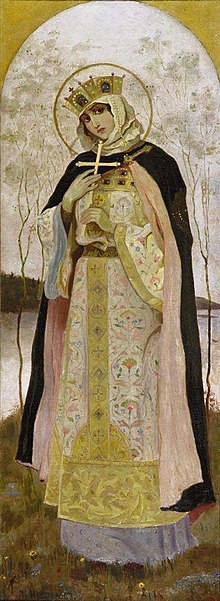Alexandra is a female given name of Greek origin. It is the first attested form of its variants, including Alexander. Etymologically, the name is a compound of the Greek verb ἀλέξειν and ἀνήρ. Thus it may be roughly translated as "defender of man" or "protector of man". The name Alexandra was one of the epithets given to the Greek goddess Hera and as such is usually taken to mean "one who comes to save warriors". The earliest attested form of the name is the Mycenaean Greek 𐀀𐀩𐀏𐀭𐀅𐀨, written in the Linear B syllabic script. Alexandra and its masculine equivalent, Alexander, are both common names in Greece as well as countries where Germanic, Romance, and Slavic languages are spoken.
Kuznetsov, Kuznyetsov, Kuznetsoff, or Kouznetsov or Kuznetsova is the third most common Russian surname, an equivalent of the English "Smith".

Oleg, Oleh, or Aleh is an East Slavic given name. The name is very common in Russia, Ukraine and Belаrus. It derives from the Old Norse Helgi (Helge), meaning "holy", "sacred", or "blessed". The feminine equivalent is Olga. While Germanic in origin, "Oleg" is not very common outside Eastern European countries.
Natalia is a female given name with the original Late Latin meaning of "Christmas Day".
Xenia is a female given name. The below sections list notable people with one of the variants of this given name.
Yulia is a female given name, the equivalent of the Latin Julia. It can be spelled Yulia, Yulya, Julia, Julja, Julija, Yuliia, Yuliya, Juliya or İulia. An alternative spelling is Ioulia/Gioulia (Greek) or Iuliia. Prononciations can differ, depending on where you are from. The name can be found in many countries, especially in Christian ones. The name is of a Christian origin as well - Saint Julia of Corsica. A few notable people from some of the countries in which the name exist are shown below.

Svetlana is a common Orthodox Slavic feminine given name, deriving from the East and South Slavic root svet, meaning "light", "shining", "luminescent", "pure", "blessed", or "holy", depending upon context similar if not the same as the word Shweta in Sanskrit.

Tatiana is a female name of Sabine-Roman origin that became widespread in Eastern Europe.
Adriana, also spelled Adrianna, is a Latin name and feminine form of Adrian. It originates from present day Italy and Spain.
Irina or Iryna is a feminine given name of Ancient Greek origin, commonly borne by followers of the Eastern Orthodox Church. It is derived from Eirene, an ancient Greek goddess, personification of peace. It is mostly used in countries within the Commonwealth of Independent States and the Balkans.
Mariya is a variation of the feminine given name Maria.
Vera is a female given name of Slavic origin, and by folk etymology it has also been explained as Latin vera meaning "true". In Slavic languages, Vera means faith. The name Vera has been used in the English speaking world since the 19th century and was popular in the early 20th century. In Turkish Vera means piety.
Yelena or Jelena is a feminine given name. It is the Russian form of Helen, written Елена in Russian.
Margarita is a feminine given name in Latin and Eastern European languages. In Latin it came from the Greek word margaritari (μαργαριτάρι), meaning pearl, which was borrowed from the Persians.
Galina, Halyna, or Halina is an East Slavic feminine given name, also popular in Bulgaria and Slovenia during the period of Soviet influence. Galina is the standard transliteration from Russian. It is generally transliterated as Halyna from Ukrainian and as Halina from Belarusian. The latter form is also frequently found in Poland.
Anastasiya is a feminine given name. Notable people with that name include the following:
Antonina and Antoņina are feminine given names and nicknames. It is a Bulgarian, Latin, Polish, Russian, and Ukrainian given name that is an alternate form of Antonia in use in Israel, Vietnam, Moldova, Bulgaria, Romania, Hungary, Slovakia, Czech Republic, Poland, Ukraine, Belarus, Lithuania, Latvia, Estonia, Georgia, Azerbaijan, Armenia, Russia, Mongolia, Kazakhstan, Kyrgyzstan, Uzbekistan, Turkmenistan, and Tajikistan. It is a Danish, Finnish, German, Italian, Norwegian and Swedish diminutive form of Antonia in use in Greenland, Finland, Norway, Sweden, Denmark, parts of the Republic of Karelia, Germany, Italy, Northern Estonia, Austria, eastern Switzerland, and parts of Romania and Hungary. Antoņina is a Latvian alternate form of Antonia in use in Latvia. Notable people with this name include the following:



